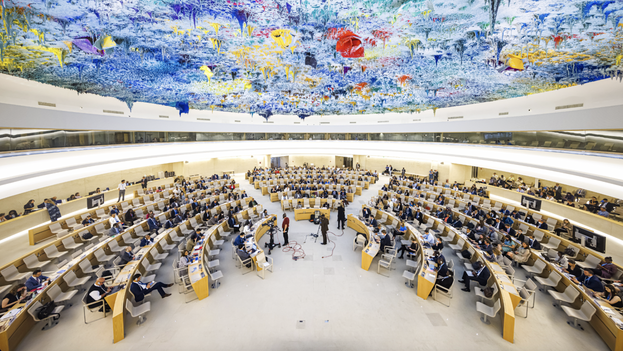
14ymedio, Yoani Sánchez, Generation Y, Havana, 19 October 2023 — A few days apart, two pieces of news showed the most hopeful and the most disappointing side of the United Nations (UN). At the beginning of October, the Security Council of this international organization approved sending more than a thousand police officers to Haiti, under the direction of Kenya. The arrival of these uniformed officers seeks to stop the spiral of insecurity and violence that has overwhelmed that Caribbean country. Many Haitians hope that the mission will make the armed gangs that control large territories lose ground, although the shadow of doubt already hangs over the effectiveness and moral integrity of the Kenyan police.
Beyond the controversy surrounding the mission in Haiti, there seems to be a consensus on the urgency of taking action. However, that same UN that feeds the expectations of improvement in more than 11 million people has, this same month, once again disappointed another part of the planet’s inhabitants after the results of the votes to join the Human Rights Council. The presence among its members of regimes that openly prey on civil and political liberties, such as China and Cuba, is a bucket of cold water thrown in the faces of activists, human rights defenders and organizations that have reported the repressive excesses committed in both countries.
The UN, which sows confidence that international organizations can save lives and guide nations on the verge of social disintegration, stands as its own nemesis by leaving the impression of being more of a conclave in which dark interests and authoritarian lobbies prevail as they please. In its spacious halls, both Beijing and Havana show great ability to pull the strings of economic and diplomatic blackmail, at their convenience. If one does it, for the most part, based on economic pressures – made possible thanks to China’s extensive investment network on several continents – the other uses its medical missions and ideological camaraderie to gain support.
Like grains of sand falling in a clock, every second – in some corner of this world – an individual loses faith in what the United Nations can do to improve their lives and those of their loved ones. There is no return from that distrust. Those who no longer believe in the UN are very unlikely to do so again. But no one can be blamed for so much suspicion and rejection towards an entity gripped by bureaucracy, clumsy in the face of the challenges imposed by the times we live in, and permeated by rivalries and alliances more focused on the confrontation between political blocks than on the search for well-being of citizens.
With two wars currently underway, the UN has not even been able to fulfill its founders’ dream of preventing new wars. Does that failure in its main reason for existing mean that it is time to create a new conclave? Better not to jump too quickly to conclusions. The forces to put an end to the United Nations have also intensified in recent years and an international scenario without this organization would benefit authoritarianism and armed confrontations even more. What to do then? Expand the work of the organization in peace missions and humanitarian work; stop the advance within it of dictatorships and nepotism. Is there time left to achieve it? Little, very little.
________________________
Editor’s Note: This article was originally published in Deutsche Welle in Spanish.
____________
COLLABORATE WITH OUR WORK: The 14ymedio team is committed to practicing serious journalism that reflects Cuba’s reality in all its depth. Thank you for joining us on this long journey. We invite you to continue supporting us by becoming a member of 14ymedio now. Together we can continue transforming journalism in Cuba.
